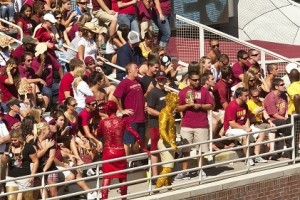A growing number of colleges are starting to allow alcohol sales at football games, The New York Times reports. West Virginia, Texas, Maryland, Minnesota, Colorado, Wake Forest, Miami, Syracuse and Louisville now sell beer at games.
West Virginia is one of a relatively small number of college teams that sell alcohol to general admission ticketholders. The team makes about $500,000 a year in beer sales. Many more teams make alcohol available in suites and to those with premium tickets, the article notes.
Universities see alcohol sales as a way to increase revenue and keep up attendance at games. Last year, attendance at college games averaged 44,190, the lowest number since at least 2003.
Maryland is selling alcohol at football and basketball games for a one-year trial period. Both Maryland and Texas contacted West Virginia for advice before starting to sell beer this fall, said West Virginia’s Athletic Director, Shane Lyons. “I feel like we’ve been a pilot program — people have seen it work,” he said.
Many schools that sell alcohol at games argue it discourages binge drinking, by letting fans pace themselves. West Virginia, which has allowed alcohol sales at games since 2011, saw a sharp drop in incident reports and arrests on home football Saturdays from 2010 to 2014.
E. Gordon Gee, West Virginia’s president, is a Mormon and does not drink. He said he is conflicted about the school’s alcohol policy. “I do believe one of the main issues confronting universities is alcohol abuse — binge drinking,” he noted.
A recent study in the Journal of Sports Economics found no evidence that beer availability at college football games increases attendance or revenue.
Published
October 2015
 Get Support
Get Support

